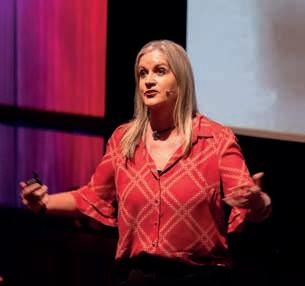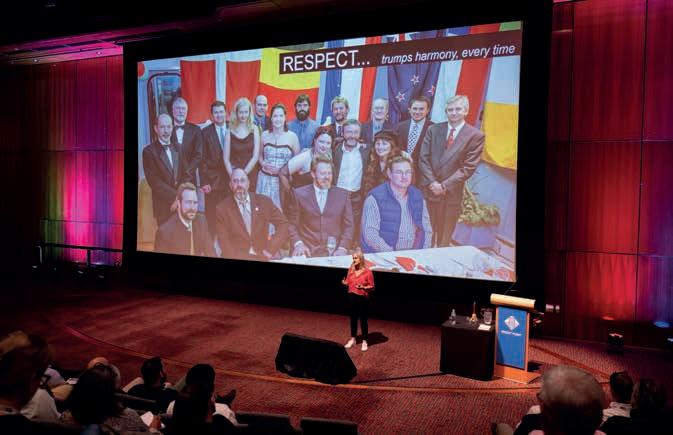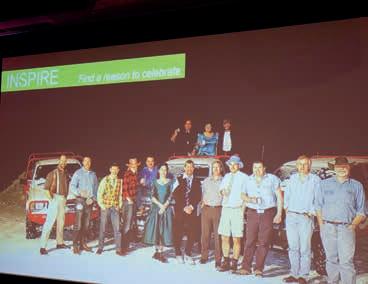
8 minute read
Australian Berry Journal – WINTER 2025 - Edition 23
Leading on the edge: A leadership story from the world’s most extreme environment
Helen Newman, Berry Industry Development Officer, Agricultural Produce Commission, WA
Rachael Robertson is a renowned leader, author, and keynote speaker who led a year-long mission to the harsh, isolated environment of Antarctica. Known for her expertise in leadership, resilience, and teamwork, at BQI25 Rachael shared powerful insights from her experiences managing extreme conditions and building high-performing teams in challenging circumstances.
You can watch Rachel's talk by visiting bit.ly/BQI25-RR
You might be wondering, how on earth did she end up in Antarctica?
It all started with a recruitment ad in the newspaper. Rachael, a Customer Service Manager at the time, was struggling to recruit customer service staff with ‘empathy’ when she saw an ad seeking a station leader at the Australian Antarctic Division camp.
The selection criteria for the position were based on personal attributes of resilience, integrity, and empathy, rather than technical skills. Intrigued by this recruitment approach, she applied for the job to see what the interview questions were. However, there was no interview … instead, the selection process was based on a week-long boot camp in the central highlands of Tasmania, where attributes (and leadership skills) were put to the test. As it turns out, Rachael had the right personal attributes and was offered the job, and she accepted!
Before sailing off to Antarctica, Rachael and the 17 recruits in her team underwent three months of intensive theoretical and practical training to acquire the technical skills needed to be self-sufficient for 12 months.
The team, which was tasked with maintaining the Antarctic Division camp, included engineers, mechanics, scientists, chefs, plumbers, carpenters, IT specialists, and a doctor. Everyone was trained in firefighting and other critical emergency services. The two carpenters were trained as theatre nurses, and the two IT officers were trained as anaesthetist assistants!
Recruit people with the qualities you need for the job because you can teach the technical aspects

Respect… trumps harmony, every time
With such extreme diversity in the group and challenging circumstances ahead (spending every day together for 12 months and enduring 4 months of total darkness), the team understood that it was not feasible to expect everyone to like each other.
Before leaving for Antarctica, the team agreed on the values they would follow while at the camp. Respect was the number one value identified by the team. The expectation was that everyone showed common professional courtesy and respect, respecting the diversity in the group.
Harmony is the outcome of respect. If you are treated with respect and your contribution is respected, harmony will be the outcome. Environments that focus on harmony as the goal can be harmful and stifle innovation because no one wants to offer different opinions for fear of ‘rocking the harmony boat’. People may not report bullying for the same reason.
When put under pressure, teams built on harmony will shatter. Teams built on respect will stand strong.
Integrity: No triangles
Many teams have the word ‘integrity’ as a value. It’s an important part of respecting others, but what does it look like? How do you describe the behaviour? How do you know you are treating each other with integrity and respect?
In Rachael’s team, integrity means no triangles. No triangles mean ‘you’ don’t speak to ‘me’ about ‘them’; ‘I’ don’t speak to ‘you’ about ‘them’. If someone has done something to upset you at work, you must have the professional courtesy and integrity to go directly to that person; you don’t take it to a third party. Have direct conversations.
It took Rachael's team about two months of practice to embed the ‘no triangles’ rule into their culture.
In a survey of over 200 teams with the ‘no triangle’ rule, 100% said it built respect and improved morale. 89% said it freed up time and productivity, and in 30% of cases, it freed up almost one hour a day! This is time and energy saved on listening to complaints, better spent being productive.
Bacon wars: Look after the little things
This is another one about respect.
The chef at the Camp had every Monday morning off, so other staff were on a roster for cooking breakfast. Bacon was on the menu, and there was a dispute over how it should be cooked. The plumbers liked their bacon soft, but the diesel mechanics liked their bacon crispy. They wanted a team meeting so that Rachael could decide how the bacon should be cooked.
But was bacon the real issue? No… it wasn’t.
Instead of having a meeting about bacon, Rachael conducted a root cause analysis, which involves asking five ‘why’ questions to identify the root cause of the problem. It turns out that the relationship between the two teams had broken down over the use of a vehicle. Each team thought the other team was deliberately cooking bacon the opposite way to irritate them. They were feeling disrespected.
The number one ‘bacon war’ in Australian and New Zealand workplaces is dirty coffee mugs. Other bacon wars might be:
• who put the empty milk jug in the fridge
• who left the lint in the dryer
• who didn’t fuel up the pool vehicle after using it
These little things that often happen in teams are a symptom of a deeper issue: a lack of respect. It has nothing to do with dishes, milk, lint, or fuel, it's about respect. It's disrespectful; it implies that one person's time is more important than another's.
It’s not until you stop focusing on the milk, lint, and fuel and start talking about respect that people change their behaviour. You need to raise the issue, sort it out by explaining how it is disrespectful, then move on, otherwise people fixate on the issue and get heated up.
Protect the tribe so the individual thrives
Emperor penguins are the only living things in Antarctica during winter, except for the people at the research camps. They only survive because of their teamwork. They sit in a huddle, and every bird has a turn on the outside bracing against the cold. When those on the outside have had enough, they go into the middle, and the birds in the middle go to the outside.
Every other bird species on the planet has a nest or a patch of turf, and they protect their own turf. If the Emperor penguins did this, they wouldn't survive. There'd be no Emperor penguins.
All it would take is just one bird to say, ‘I don't want to go the outside today it's too cold’, and the other birds would say, ‘well he's not doing it, so I'm not doing it’, and before long, the whole thing falls over.
This is a fantastic metaphor for a team: you protect the team, keep the team strong, relevant, and resilient, and then every individual will thrive.
Rachael suggested that Emperor penguins would be a fantastic mascot for the berry industry because of the diversity of skills and professions, growers, suppliers, scientists, and government. All at BerryQuest together to support the industry.
Leadership without a title
Leadership isn't a title; leadership is seeing something that needs to be done and doing something about it. Rachael recounted examples of this in her Antarctic team and asked berry growers to take the pressure off themselves and encourage leadership without titles in their teams.
Anyone in a team can lead. They don't need to rely on the leaders in the business to be the sole source of leadership. If they've got a great idea, let them bring it; if they can see a cost saving, let them bring it. If they see something that needs to be done, they will do something about it. That's leadership; leadership isn’t a title, it’s a behaviour.
Inspire! Find a reason to celebrate
Antarctic winters are tough at the camp. There is no light outside, and every day for four months is spent indoors with your co-workers!
Every job has an Antarctic winter, a period where work is just work, when no big, exciting things are happening. If you want to keep yourself and your team inspired and motivated during these times, you need to find a reason to celebrate.
Moments of celebration build momentum and create a sense of achievement. The celebrations don’t need to be big parties, they can be words in a meeting or on a whiteboard or talking one-on-one with staff. Some achievements Rachael’s team celebrated included 100 days without a blackout, 50 days without the server crashing, and monthly safety targets.
Don’t wait until the end of the year (or season) to celebrate; do it regularly.

USEFUL RESOURCES
Rachael has a host of resources available on her website, which are very useful for sharing some of these key messages within your own teams.
Visit: www.rachaelrobertson.com.au/ for more information



